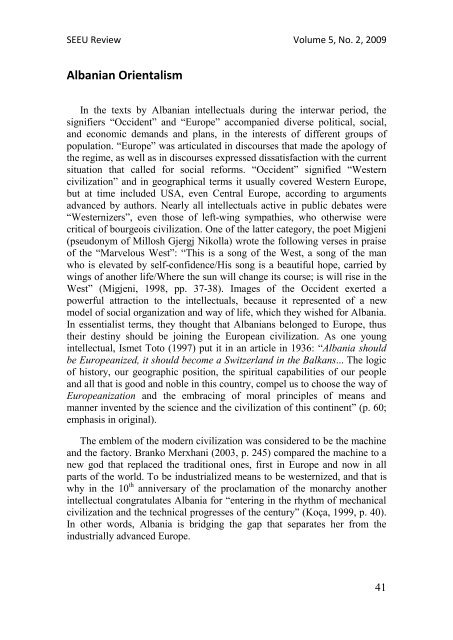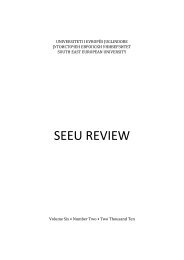SEEU Review vol. 5 Nr. 2 (pdf) - South East European University
SEEU Review vol. 5 Nr. 2 (pdf) - South East European University
SEEU Review vol. 5 Nr. 2 (pdf) - South East European University
You also want an ePaper? Increase the reach of your titles
YUMPU automatically turns print PDFs into web optimized ePapers that Google loves.
<strong>SEEU</strong> <strong>Review</strong> Volume 5, No. 2, 2009<br />
Albanian Orientalism<br />
In the texts by Albanian intellectuals during the interwar period, the<br />
signifiers “Occident” and “Europe” accompanied diverse political, social,<br />
and economic demands and plans, in the interests of different groups of<br />
population. “Europe” was articulated in discourses that made the apology of<br />
the regime, as well as in discourses expressed dissatisfaction with the current<br />
situation that called for social reforms. “Occident” signified “Western<br />
civilization” and in geographical terms it usually covered Western Europe,<br />
but at time included USA, even Central Europe, according to arguments<br />
advanced by authors. Nearly all intellectuals active in public debates were<br />
“Westernizers”, even those of left-wing sympathies, who otherwise were<br />
critical of bourgeois civilization. One of the latter category, the poet Migjeni<br />
(pseudonym of Millosh Gjergj Nikolla) wrote the following verses in praise<br />
of the “Marvelous West”: “This is a song of the West, a song of the man<br />
who is elevated by self-confidence/His song is a beautiful hope, carried by<br />
wings of another life/Where the sun will change its course; is will rise in the<br />
West” (Migjeni, 1998, pp. 37-38). Images of the Occident exerted a<br />
powerful attraction to the intellectuals, because it represented of a new<br />
model of social organization and way of life, which they wished for Albania.<br />
In essentialist terms, they thought that Albanians belonged to Europe, thus<br />
their destiny should be joining the <strong>European</strong> civilization. As one young<br />
intellectual, Ismet Toto (1997) put it in an article in 1936: “Albania should<br />
be <strong>European</strong>ized, it should become a Switzerland in the Balkans... The logic<br />
of history, our geographic position, the spiritual capabilities of our people<br />
and all that is good and noble in this country, compel us to choose the way of<br />
<strong>European</strong>ization and the embracing of moral principles of means and<br />
manner invented by the science and the civilization of this continent” (p. 60;<br />
emphasis in original).<br />
The emblem of the modern civilization was considered to be the machine<br />
and the factory. Branko Merxhani (2003, p. 245) compared the machine to a<br />
new god that replaced the traditional ones, first in Europe and now in all<br />
parts of the world. To be industrialized means to be westernized, and that is<br />
why in the 10 th anniversary of the proclamation of the monarchy another<br />
intellectual congratulates Albania for “entering in the rhythm of mechanical<br />
civilization and the technical progresses of the century” (Koça, 1999, p. 40).<br />
In other words, Albania is bridging the gap that separates her from the<br />
industrially advanced Europe.<br />
41

















